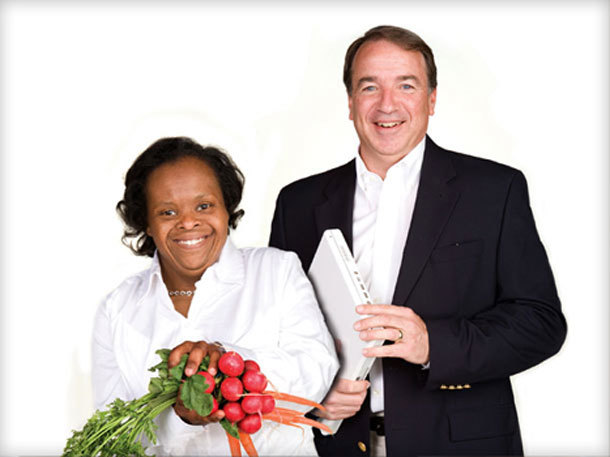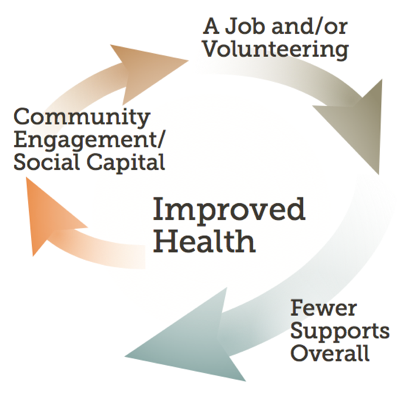About
Pre My25, approximately 70% of people supported are moving away from a normal BMI. Post and ongoing My25, 70% of people supported are at or moving toward a normal BMI—associated expenses reduce materially. And social determinants of health elevate.
Mainstay's My25 content and technology-based products are a health-centric solution utilized by leading provider organizations, state disabilities services, MCOs and ACOs throughout 30 states. We uniquely facilitate substantial outcomes regarding: improved clinical and social determinants of health (click here); diminished acute care and prescription medication expense; reduced LTSS food and labor costs (click here); a streamlined day for staff; elevated person-centered choice; and a decrease in risk and compliance exposure/pay-out. Watch our brief overview video.
Our trailblazing innovaton centers on Strategic Mealtime & Technology-Supported Mealtime. With a laser focus on human services, we tailor supports for individuals with intellectual & developmental disabilities, traumatic brain injury, serious and persistent mental illness, and behavioral health challenges in waiver, ICF, supported living, and home/foster-based settings.
Scroll down to learn how My25 is synergistic with value-based purchasing and managed care expectations.

Our founder, Jim Vail, was CEO of a provider organization in Illinois that served people with I/DD in community-based settings. Jim noticed a number of compelling trends in the industry and felt it vitally important to stay ahead of the perfect storm roiling the human services industry, positioning his agency as a leader vis a vis value-based purchasing and managed care expectations.
Without hesitation, he focused on the health of people supported and the dynamics surrounding mealtime. Jim noted that a majority of consumers—70% of people with disabilities throughout the U.S. are moving away from a normal BMI—were unnecessarily struggling with poor health and subpar quality of life, largely as a result of eating the wrong foods in the wrong amounts. Jim simultaneously zeroed in on the fact that staff and family members were often challenged by lackluster health status for the same reasons.
Further, DSPs were a high turnover faction and largely inexperienced regarding nutrition and kitchen skills. Budgets were perpetually tight and person-centered choice was a priority, but often misinterpreted and difficult to deliver at mealtime. There was a lot of talk about social determinants of health, but Jim deemed that clinical health had to come first as the necessary foundation upon which other facets of life can improve; it's difficult to hold down a job if you're perpetually clocking in absences due to poor health. The challenge was clearly . . . well, challenging.
Jim set out to solve the problem, and its various tentacles, in an innovative way—which is the genesis of Mainstay/My25 and "foolproofing mealtime and preventive health" along person-centered guidelines. These early efforts included collaborating with professionals from Northwestern University's Feinberg School of Medicine to establish My25's foundational tactics and tools. On the heels of implementing My25 at this point, Jim's agency received one of the first-ever, 4-year CQL accreditations awarded, placing his social services organization in the top 1% worldwide. Next, the USDA (United States Dept. of Agriculture) backed nationwide trials to test the efficacy of Mainstay/My25 on a broad-scale basis.
We delivered. My25's outcomes were highly favorable on all counts . . . including 70% of people supported now at or moving toward a normal BMI within 6 to 18 months following My25 implementation—a statistic that continues to be reported today among My25 subscribers.
So we commercialized. And because we were daily proving the age-old assumption wrong—the poor health status of people supported is a result of the genetics of their disability and/or pharmacological complications—Jim attracted a team of highly respected human services industry, preventive health, disease management, nutrition, culinary, business, and technology professionals to propel My25 product development and supports even further along.
People supported, who are now healthier, are more able to embrace job/volunteering and community engagement opportunities; which leads to a reduction in overall supports. Interestingly, and something we didn't expect . . . caregivers, family members, and associated staff start to improve their own health as a result of involvement with the My25 program as it relates to their interface with individuals served.
We center on food because it's the key driver behind weight and diabetes management for most everyone. We're not opposed to exercise for toning and cardio purposes, but substantial health gains related to weight management are unlikely to evolve from a walking club or jumping jacks. Besides, everyone has to eat. And what we've discovered is that as health improves as a result of proper nutrition, physical activities are more likely to be proactively embraced. Additionally, it's continually reinforced to us that addressing mealtime is the most programmatically and economically feasible way for the human services industry to accomplish preventive health and reduced expense . . . which is necessary as medical care cost is now starting to outstrip long term services and supports expense.
Our initial efforts and successes were focused on people with I/DD in waivers and ICFs through our first product, My25 Choice (mealtime resources toolkit); My25 Choice remains a core component of our portfolio and substantial outcomes. In response to market demand and what we were learning about the most effective ways to ironclad health improvement and associated expense reductions, we additionally created My25 Elevate, My25 Flex and My25 Bullseye. As a result, the My25 footprint encompasses a preventive health solution for any person with a disability, living in any type of residential setting. Watch our overview video.
Unlike popular mainstream and fad diet programs, My25 is tailored—with personalization/customization—to people with disabilities and their unique needs . . . and those of their primary caregivers, including DSPs. Simiultaneously, and again unlike popular weight-loss programs, we faciliate outcomes central to the organizations and funders associated with individuals served. Strategic Mealtime.
The Mainstay/My25 team and its astute partners are moving the preventive-health needle, substantially reducing associated costs, streamlining the mealtime day, and establishing quality that is heads above the status quo. Foolproof. We're facilitating game-changing innovation that is rarely evident, but much needed, in the human services arena. See what our president wrote here. And watch: Brian's Story.
"Our experience with My25 over many years has been as win-win as it gets."
~ Carl LaMell, CEO, Clearbrook

Better health is at the crux of reduced, overall supports.
 My25 is powered by Mainstay, Inc.
My25 is powered by Mainstay, Inc.